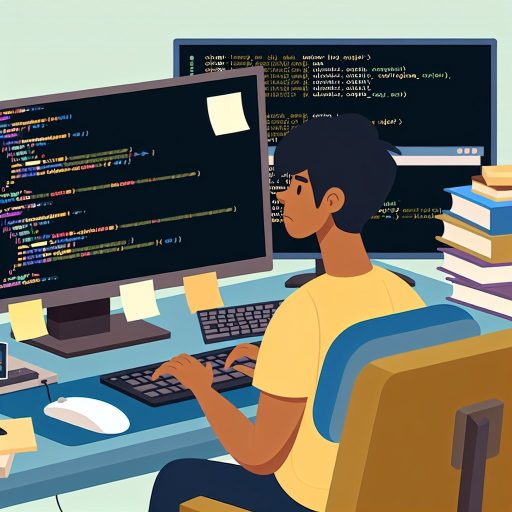Define Your Coding Goals
Establishing clear coding goals is essential for effective learning.
Consider what you want to achieve through coding.
Do you aim to build web applications, mobile apps, or work in data science?
Each goal requires different skills and languages.
Write down your primary objectives for clarity.
This approach keeps your learning focused and practical.
Setting Specific Goals
To define your goals, be specific about your desires.
For instance, instead of saying “I want to learn coding,” say “I want to learn Python for data analysis.”
Specific goals enhance your motivation and accountability.
Break your larger goals into smaller, manageable tasks.
For example, start with understanding basic syntax or data types.
Revisiting Your Goals
Regularly revisit your goals to assess your progress.
Adjust them as you learn and grow in your coding journey.
Remember, flexibility is key to adapting your learning path.
This adaptability makes the process less overwhelming.
Tech Consulting Tailored to Your Coding Journey
Get expert guidance in coding with a personalized consultation. Receive unique, actionable insights delivered in 1-3 business days.
Get StartedUnderstand Your Learning Style
Recognizing your learning style is crucial for effective coding education.
Are you a visual learner, auditory learner, or kinesthetic learner?
Your learning style impacts how you absorb new information.
Understanding this can simplify your learning process immensely.
Identifying Your Learning Style
Reflect on past experiences to identify your preferences.
Do you remember concepts better through videos or reading?
Use this knowledge to select appropriate learning resources.
For visual learners, tutorials with diagrams may be appealing.
Conversely, auditory learners may thrive with podcasts or discussions.
Adapting Resources to Your Style
Once you know your learning style, tailor your resources accordingly.
Consider interactive tutorials for hands-on learners.
Alternatively, structured courses might suit learners who prefer guidelines.
Utilizing the proper resources reduces feelings of overwhelm.
It fosters a more positive and effective learning experience.
Build Your Vision, Perfectly Tailored
Get a custom-built website or application that matches your vision and needs. Stand out from the crowd with a solution designed just for you—professional, scalable, and seamless.
Get StartedBreak Down Complex Topics into Manageable Chunks
Chunking information makes learning more effective.
It simplifies complex topics into smaller parts.
This approach reduces overwhelm and enhances focus.
Understanding the Importance of Chunking
Start by identifying the main concepts within a topic.
Focus on the essential elements to build a strong foundation.
For instance, breaking down programming languages into syntax and semantics can help.
Identifying Key Concepts
Organize information into categories or groups.
This strategy helps you see the relationships between different concepts.
For example, categorize coding concepts as variables, functions, or data structures.
Creating Categories
Establish specific goals for each manageable chunk.
This practice keeps you motivated and on track.
For example, aim to understand functions in one study session.
Setting Goals for Each Chunk
Use a variety of resources to reinforce learning.
These can include tutorials, videos, and coding challenges.
Optimize Your Profile, Get Noticed
Make your resume and LinkedIn stand out to employers with a profile that highlights your technical skills and project experience. Elevate your career with a polished and professional presence.
Get NoticedCombine these resources to deepen your understanding of each chunk.
Utilizing Resources Effectively
Schedule regular reviews to reinforce what you’ve learned.
This method helps ensure retention of the material over time.
Try to revisit each chunk periodically to solidify your knowledge.
Set a Realistic Learning Schedule and Stick to It
Establish a Consistent Routine
Begin by determining how much time you can dedicate weekly to coding.
Consider your other commitments when planning your schedule.
This approach helps you create a sustainable learning routine.
Break Down Your Goals
Set small, achievable goals for each learning session.
For example, focus on one coding concept at a time.
Breaking your goals into smaller chunks reduces overwhelm.
Use a Planner or Digital Tools
Utilize a planner or digital tools to keep track of your schedule.
Visualizing your goals can motivate you to stay on track.
Additionally, set reminders to review your progress regularly.
Incorporate Breaks and Downtime
Schedule breaks during your learning sessions for better focus.
Short breaks will help refresh your mind and improve retention.
Additionally, allow time for relaxation to avoid burnout.
Stay Flexible and Adjust as Needed
Be open to adjusting your schedule based on your progress.
If a particular topic is challenging, give yourself more time.
Flexibility can prevent feelings of frustration and overwhelm.
Seek Support When Necessary
Join online communities to connect with other learners.
Sharing your experiences can provide encouragement and motivation.
Remember, seeking help is a vital part of the learning process.
Delve into the Subject: How to Choose Simple Projects to Build Confidence
Utilize Coding Resources Effectively
Online Courses
Online courses provide structured learning paths for coding languages.
They often include video lectures, quizzes, and exercises.
Consider platforms like Coursera, Udemy, or Codecademy for great options.
Set aside dedicated time for these courses to ensure consistency.
Take notes to reinforce key concepts as you progress.
Forums and Communities
Engaging in online forums can enhance your coding journey.
Communities like Stack Overflow are invaluable for quick help.
You can ask questions and share insights with other learners.
Join coding groups on social media for additional support.
Building connections can lead to mentorship opportunities.
Tutorials and Documentation
Tutorials are excellent for hands-on practice with new skills.
Sites like W3Schools and MDN Web Docs offer comprehensive guides.
Use these tutorials to complete mini-projects and apply what you learn.
Documentation is essential for understanding coding frameworks and libraries.
Regularly consulting documentation can deepen your coding knowledge.
Set Realistic Goals
Define clear and achievable learning objectives.
Break your coding journey into smaller, manageable milestones.
This approach prevents feelings of overwhelm and keeps you motivated.
Celebrate progress as you complete each milestone.
Adjust your goals as needed based on your pace of learning.
Balance Learning with Practice
Practice coding regularly to reinforce your skills.
Try to implement what you learn in real projects.
Building projects enhances comprehension and retention of concepts.
Consider pair programming with a fellow student for collaborative learning.
Balance theoretical learning with practical application for optimal growth.
Learn More: The Most Common Beginner Coding Mistakes and How to Avoid Them
Practice Coding Daily in Small Increments
Importance of Consistency
Consistency is crucial when learning to code.
Daily practice helps reinforce knowledge and skills.
Small increments make learning manageable and enjoyable.
Setting Achievable Goals
Establish clear and achievable coding goals.
This approach fosters a sense of accomplishment.
For example, aim to complete one coding challenge each day.
Utilizing Breaks Effectively
Breaks enhance focus and retention during learning sessions.
For instance, practice for 25 minutes, then take a 5-minute break.
Use breaks to recharge and reflect on what you learned.
Finding Resources that Align with Your Style
Select resources that cater to your learning style.
Interactive platforms like Codecademy can be particularly effective.
Alternatively, consider reading coding books or watching tutorials.
Building a Support Network
Engage with fellow coders for motivation and support.
Join forums or online communities to share experiences.
Collaboration enhances learning and problem-solving skills.
Monitoring Your Progress
Track your daily coding practices and accomplishments.
Use a journal or an app to log your sessions.
This habit helps identify areas for improvement.
Discover More: The Importance of Writing Pseudocode Before Coding

Coding Communities: Your Support Network
The Importance of Connection
Joining a coding community offers invaluable support.
It connects you with like-minded individuals who share your interests.
These connections foster a sense of belonging and collaboration.
Learning Through Shared Experiences
In a coding community, shared learning is common.
Members can exchange knowledge and resources with each other.
This collaboration enhances your learning experience significantly.
Finding the Right Community
Select a community that aligns with your goals.
Many online platforms cater to diverse coding languages and levels.
For instance, platforms like GitHub and Stack Overflow are excellent options.
Participating Actively
Engagement is key in any community.
Ask questions when you’re unclear about a topic.
Help others who may be struggling with concepts you understand.
Attending Events and Meetups
Look for local or virtual coding meetups in your area.
These events provide opportunities to learn from experts.
Networking at meetups can lead to valuable personal connections.
Cultivating a Growth Mindset
Embrace challenges as learning opportunities.
Be open to feedback and improve your skills accordingly.
A growth mindset will help you thrive in a coding community.
Delve into the Subject: How Understanding Syntax Can Make or Break Your First Coding Experience
Incorporate Mindfulness Techniques
Understanding Mindfulness
Mindfulness is the practice of being present in the moment.
It helps reduce stress and improve focus.
Incorporating mindfulness into your coding routine benefits your learning process.
Simple Mindfulness Exercises
Start your coding sessions with deep breathing.
Take a moment to breathe in deeply and exhale slowly.
This helps clear your mind and prepare for focus.
Additionally, consider practicing meditation regularly.
Even a few minutes can enhance your mental clarity.
You can also try guided mindfulness apps to assist you.
Creating a Mindful Environment
Your workspace significantly impacts your ability to concentrate.
A tidy and organized desk promotes a clearer mind.
Moreover, reduce distractions by turning off notifications.
Consider using noise-canceling headphones for better focus.
Set specific times for learning and stick to that schedule.
Utilizing Visualization Techniques
Visualization can enhance your coding skills effectively.
Take a moment to visualize successful coding sessions.
Imagine overcoming complex problems before you start working.
This mental rehearsal can build confidence in your abilities.
Establishing a Routine
Developing a consistent routine is crucial for learning.
Allocate specific times each day for coding practice.
Include short breaks to recharge your mind during sessions.
During these breaks, practice mindfulness by focusing on your breath.
Tracking Progress Mindfully
Keeping track of your progress helps maintain motivation.
Celebrate small wins in your coding journey.
Reflect on what you’ve learned after each session.
This reflection solidifies your understanding and benefits you mentally.
Regularly Review and Reflect on Your Progress
The Importance of Reflection
Reflecting on your progress helps solidify your learning.
It allows you to recognize your strengths and weaknesses.
Additionally, you gain insights into your coding journey.
Set Aside Time for Review
Designate a specific time each week for reflection.
This consistency fosters a habit of self-evaluation.
Choose a quiet space to minimize distractions.
Track Your Achievements
Maintain a log of your completed projects and challenges.
Documenting progress visually helps maintain motivation.
It also provides a reference for future projects.
Seek Feedback Regularly
Engage with peers or mentors for constructive feedback.
This external perspective enhances your learning.
Moreover, it opens opportunities for growth and collaboration.
Adjust Your Learning Plan
After reflection, modify your study plan as necessary.
This adaptability keeps your learning relevant and effective.
You can focus on areas that need improvement.
Celebrate Small Victories
Acknowledge your accomplishments, no matter how small.
Celebrating progress boosts confidence and motivation.
Share your achievements with friends or peers for encouragement.
Additional Resources
Is feeling mentally overwhelmed normal when learning code, even …




